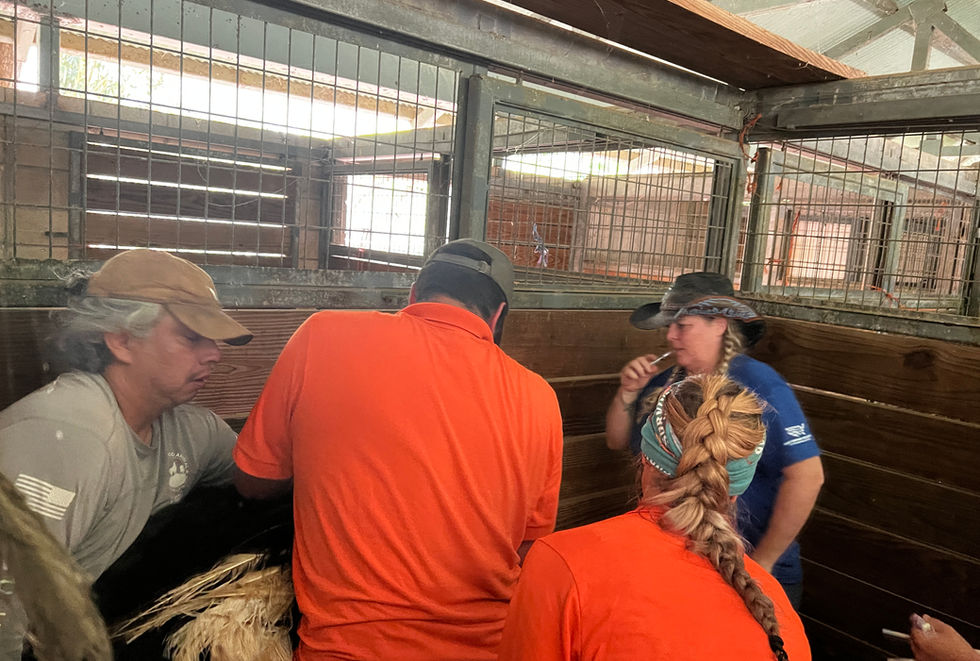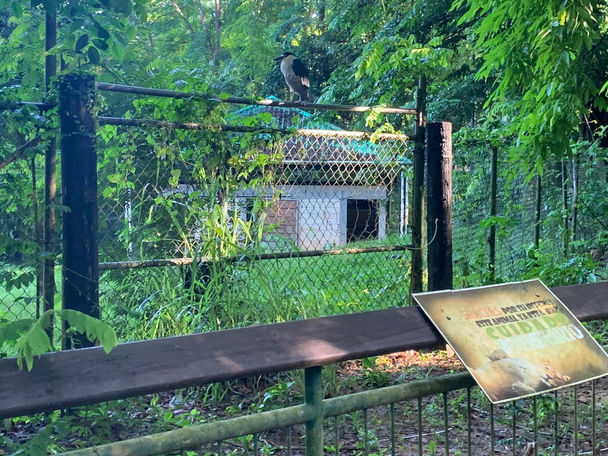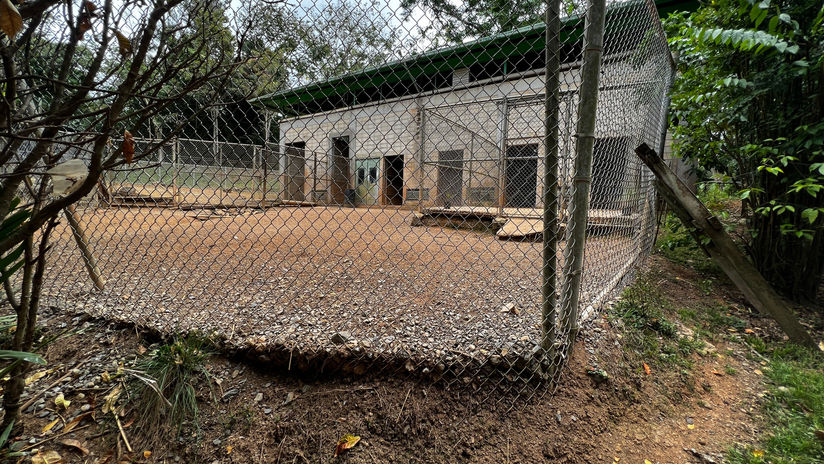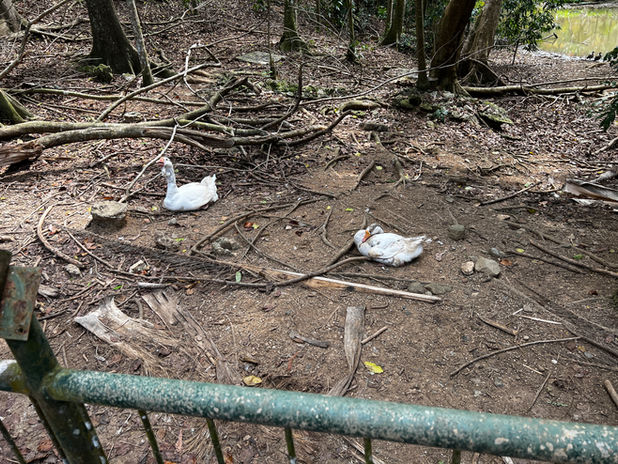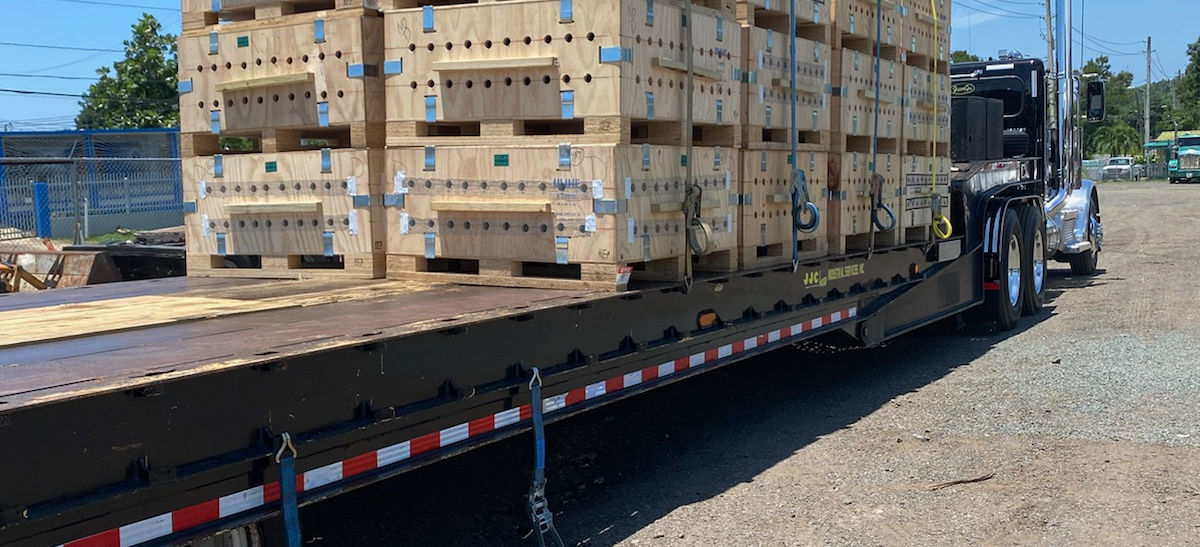Rescate del Zoológico de Puerto Rico
UPDATES
Updated 6/25/2023
¡Por favor ayúdenos con este rescate urgente!
¡Le escribo para pedirle su ayuda para salvar cientos de vidas que están en peligro ahora mismo mientras lee estas palabras! ¡lo más rápido posible!
Como muchos de ustedes saben, las misiones de rescate de animales nunca son fáciles ni convenientes, ya que salvar la vida de los animales en peligro casi siempre requiere una acción muy rápida y decisiva. Tal es el caso de la misión de rescate estamos emprendiendo ahora mismo mientras aprovecho este fugaz momento para escribirles.
Hemos sido llamados por el Departamento de Justicia de los Estados Unidos (DOJ) para ayudar a rescatar a más de 600 animales cuyas vidas actualmente penden de un hilo en la isla de Puerto Rico.

Avance rápido hasta hoy y más de la mitad de los animales han muerto o desaparecido, ¡por eso el Departamento de Justicia de EE. UU. ha tenido que intervenir! El objetivo es eliminar a todos los animales restantes. antes de que nadie más sufra la misma suerte.
Es por eso que nosotros, The Wild Animal Sanctuary, fuimos llamados por el Departamento de Justicia, ya que sabían que somos una de las pocas organizaciones que puede eliminar con éxito a todos los animales allí y llevarlos a un buen hogar._cc781905-5cde-3194-bb3b -136bad5cf58d_ Algunos, como los leones africanos y los osos negros, vendrán a nuestro santuario la próxima semana... mientras que otros, como "Mundi", el elefante africano, volarán a un santuario de elefantes en Georgia en las próximas semanas.

Ya hemos enviado numerosos equipos a Puerto Rico para llevar a cabo el proceso de evacuación y hasta ahora hemos tenido éxito en traer un final feliz a una cantidad de casos increíblemente tristes. Chimpancé hembra que había vivido sola mientras estaba encerrada en casa durante muchos años.
¡Afortunadamente, ahora Mara ha sido rescatada y llevada a un nuevo y maravilloso hogar en Indiana, donde ahora puede vivir con otros chimpancés!
OOtros, como el perezoso solitario y dos cóndores andinos, también han sido transportados por aire a un lugar seguro y ahora vivirán el resto de sus vidas en instalaciones seguras y acogedoras que se especializan en el cuidado de sus especies únicas. Sin embargo, "Felipe", el rinoceronte blanco africano, así como dos hipopótamos ancianos esperan el día en que podamos llevarlos a su nuevo hogar en Texas.

Docenas y docenas de otros animales están listos para irse y también esperan la oportunidad de volar a un nuevo hogar. ¡considere ayudarnos hoy con su generosa donación!
Todas y cada una de las donaciones, sin importar cuán grandes o pequeñas sean, marcarán la diferencia, así que únase a nosotros para ayudar a estas increíbles criaturas, muchas de las cuales han estado esperando durante más de una década a que alguien se preocupe.
¡Créame cuando le digo que le estaré eternamente agradecido por su ayuda con esta misión de rescate tan urgente e importante! ¡verano!
¡Haga una donación hoy y comparta esta historia con sus amigos y familiares! ¡Gracias por preocuparse!
Yet, one by one the generators began to fail and eventually be abandoned. There were a few key units the zoo tried desperately to keep operating, such as the one running the commissary where all the animals’ food was stored. Another happened to be the largest generator on the property, which supplied the office and guard shack with power for a few hours per day.
However, most buildings and key areas remained without power, which of course left many animals having to pay a heavy price. The African Lions were a good example, since their indoor housing was more or less a concrete sweat box where the lack of power meant the numerous fans which had been installed years earlier to help circulate the oppressively hot, humid and stale air sat rusted and idle.
The most obvious issue revolved around an established protocol where only one set of keys was available for the caretakers to use. Not only was there only one set for more than a dozen people to share... but in addition, only one caretaker at a time could take the set and go about doing their work.
This evolved into one caretaker using them for an hour or so, then being forced to hand them over to the next person in line. As such, very little was done for each set of animals since each keeper had to get in and out of their assigned area very quickly.
We were told by the Zoo’s management this practice was put in place because the keepers could not be trusted to have their own set of keys. This seemed odd at first, but the longer we were there, the more obvious the reasoning became.
Simply put, the reason for so many animals dying on a regular basis seemed to be very evident and hinged on two things. One was a lack of funding to operate the zoo in a manner that would fully protect the animals... and two, was the general disconnect that seemed to be extremely pervasive.
Not being inspected by the USDA on a regular basis for more than 5+ years, combined with not being open to the public and being held to a certain level of transparency relating to the care of the animals, definitely seemed to not only create, but also maintain a false sense of adequacy.
Nearly every single employee that we spoke to at the zoo was thoroughly convinced they were doing a stellar job of caring for the animals. The numerous ones we talked with during our 6+ weeks of being there working 12-14 hours a day - 7 days a week - in many areas of the zoo were at a loss to understand why we or anyone else thought there were any issues at all – especially with the overall care of the animals and the implementation of adequate veterinary care.
Although the odds were stacked against him, there was one caretaker that actually stood up to the others and openly acknowledged there were serious issues and he agreed with the accusations of inadequate care. Sadly, he was shunned and verbally accosted by his fellow employees. We admired his courage to hold strong against the overwhelming pressure and his choice to stand in defense of the animals.
The Animals...
From as far back as 2012 there has been significant public and private controversy surrounding the zoo and its overall care of the animals. From social and enrichment issues related to highly social and intelligent creatures such as the Chimpanzees and lone Elephant, to the uncontrolled births and deaths which included African Lion cubs that were born and then died under highly suspect circumstances.
Death became a regular occurrence at the zoo over the years and continued to remain a pervasive issue even when we were called in to remove the animals. Poor diets, restricted caretaker access and many other internal operational issues contributed to the deaths that we were exposed to.
Even a lone male Mountain Lion was allowed to suffer from a cancerous growth on his elbow to the point where he needed to be humanely euthanized after our veterinary team was able to visually assess his vastly deteriorated condition. Others, like Mikey the male Black Bear whose female partner had just recently died prior to our arrival, was found suffering in a small cage buried behind a wall of thick overgrowth.

Laying in a bed of concrete road base material used for his cage flooring, Mikey was suffering from numerous conditions, the worst of which included severe arthritis and an ulcerated eye that needed medical attention. Barely able to wake and rise to the occasion of our first visit, it was incredibly evident that he needed pain management on a full-time basis.
Yet, he and so many other animals were left to deal with blatantly painful issues, while many more eventually died from undetected illnesses due to a lack of regular medical checkups. There was no doubt that the entire population was in danger and needed to be removed as quickly as possible.

The zoo had a set of iconic animals that the public were focused on, which included a female chimpanzee named Mara, and a female elephant named Mundi. Others, such as the Rhinoceros named Felipe, and the Hippopotamuses named Pipo and Cindy were also celebrities, but admittedly, to a lesser degree.
Regardless, upon our arrival to begin the removal process, it quickly became evident how the entire island was split between those who believed the zoo should be renovated and reopened... and those who realized there were countless facility issues and blatant problems with animal care, which meant the only humane option would be to have the animals removed and rehomed elsewhere.
_JPG.jpg)
Yet, the animal that held the leading role in nearly every bit of controversy on and off the island was Mundi the elephant. She was by far the most iconic animal at the zoo and every discussion relating to the zoo and its future revolved around her.
It seemed nearly everyone who was in favor of keeping the zoo open believed as long as Mundi remained on the island the zoo would eventually be brought back to life. On the flipside, there were just as many people who believed Mundi’s departure would help to seal the zoo’s fate.
_JPG.jpg)
As weeks passed leading up to Mundi’s departure, these two factions began to battle, both virtually on the internet, as well as physically in real life. Both Pat Craig and Carol Buckley were damned to hell via countless protestor billboards and picket signs... as were their associated organizations.
When the days remaining before her scheduled flight to freedom grew short, terrorist-like tactics began to be employed. From masked intruders sneaking into the zoo through thick underbrush... to numerous drones coming down from the sky to harass Mundi, there seemed to be no end to what the “keep Mundi on the island” faction was willing to do.
One of the social media attempts to thwart Mundi’s daily conditioning to load in and out of her travel crate involved an island-wide call for people to come in droves to the zoo’s perimeter fence in order to clank, bang and beat metal pots and pans together in an attempt to scare Mundi. Thankfully, the Puerto Rico government, USDA-OIG and US Fish and Wildlife Service responded overnight and installed enough law enforcement personnel to keep any willing participants from getting near the zoo.
However, just two days before the scheduled airlift, one or more of the opposing factions was able to hit Mundi in the rear end with a projectile while she was standing in her crate peacefully eating carrots and hay. In response, Mundi immediately flew backwards out of her crate and ran around her enclosure trumpeting and waiving her tail in the air.
_JPG.jpg)
She subsequently spent the next two days avoiding the crate since she believed it had something to do with the assault. Thankfully, Carol Buckley was able to calm her substantially during the same timeframe. Yet, on the day of the move, although many hours were spent trying to get Mundi to enter the crate willingly, she repeatedly abandoned every effort she made to enter the space.
Thankfully, we were able to get Mundi loaded with the help of a world-renowned elephant veterinarian who had been brought in to help calm Mundi’s nerves if a situation like this presented itself. With the help of an exceptionally light sedative, Mundi’s fear of the crate quickly subsided. This change in attitude allowed the expert team of elephant transporters to gently guide her into the crate where she remained comfortable in the belief whatever had struck her in the rear just days earlier, was now gone.

To the credit of those who loved Mundi, the road leading to the airport was lined with thousands of people (at 1:00 in the morning) who came to say goodby and wish her well. After such a terrible battle leading up to the day of her transport, it was nice to witness an end to the island-based battle through such a universal display of love.

The Players...
There is no doubt that our Wild Animal Sanctuary bore the brunt of the work and expense related to this rescue. There was no funding or financial assistance provided, as we paid for the transport costs associated with every animal that left the Zoo and Detention Center.
Numerous staff took turns going to Puerto Rico in shifts to both enable and participate in the massive rescue effort. There were no days off or personal recreation time as there were far too many animals’ lives hanging in the balance.

Hundreds of transport crates needed to be shipped to the island, or built on site, and dozens of people had to work tirelessly preparing them for each unique species that would soon utilize them for transport to their new homes. From the 19,000-pound elephant crate that was provided by Stephen Fritz and his team of professional elephant movers... to the tiniest container that was obtained to hold a single goldfish who had been long forgotten inside a dark and dingy abandoned aquarium room... every crate needed to be exactly the right fit and finish for the animal that would soon occupy it for a predetermined amount of time.
Many veterinarians and technicians traveled to Puerto Rico to help test and prepare animals for transport. Two additional island-based veterinarians, along with staff at their associated clinics, helped treat sick animals suffering from neglect. Everyone was there to help the animals, and there was no end to the number of sacrifices everyone made on their behalf.
Military service veterans came as well, bringing their love for animals and desire to help. Most notably, there were officials from the Department of Justice, the US Attorney’s Office, the USDA, and US Fish & Wildlife Service who worked day and night to ensure every animal was represented and protected.
They provided unending support and made many personal sacrifices to ensure the animals were well cared for and supported in every way. They never wavered from their commitment to help us with this mission, and we remain eternally grateful for the support.

Companies like JJC Enterprises who assisted us with the transport of challenging animals such as Mundi the elephant and her mega vertebrate cousins, the hippos and rhino, were truly amazing. With massive cranes for lifting Mundi while inside of her gigantic steel crate, to supplying dozens of semi-trucks, forklifts, and all the manpower you could ask for to manage the loading of crates during each massive moving day, they met the challenge head on and succeeded every time at providing excellent services.


The Detention Center...
In addition to the terrible conditions that existed at the Zoo, there was another horrendous facility located on the island that was called “The Detention Center.” It was supposed to be more of a wildlife rehab facility but ended up becoming a virtual death camp as far as we were concerned.
Both native and non-native animals were brought to this facility to be held until their final disposition could be determined. In some cases, hawks and other injured birds were able to be released back into the wild... yet, many other species weren’t as fortunate.
Rhesus Macaque monkeys who initially escaped from a Puerto Rico based laboratory now represent a major problem, as they are reproducing and constantly getting into trouble. Large Pythons and Boas also represent a major problem on the island, since massive numbers are captured and brought to the Detention Center monthly.
Caiman also arrive on a near daily basis as a result of being removed from ponds, streams and nearly every other water source that can be found. Turtles of all types also enter the complex at an alarming rate, which puts the small band of Division of Natural Resource guards who are charged with operating the facility at a disadvantage.
Topping off the list of abandoned animals are the exotic birds, such as parrots, finches, and other assorted colorful characters. Yet, there is nowhere on the island for any of these detainees to go, so that is why we were asked to step in and help another 400+ animals escape their confines and find sanctuary elsewhere.
The Outcome...
Thanks to your support and that of countless other compassionate people, we were able to respond to this crisis. In one of the largest zoo closures to ever take place within the United States and its associated territories, we succeeded in saving hundreds of animals' lives!
Thanks to the U.S. Department of Justice and the U.S. Attorney’s Office in Puerto Rico, who took the initiative to pressure the Puerto Rican Government into agreeing to permanently close the zoo, there are now more than 700 animals alive and well today. The vast majority were able to fly to new amazing homes that were waiting for them here within the states... while a select number of invasive and/or diseased species remained on the island. Those were transported to appropriately licensed facilities where they will be cared for and inspected regularly.


Puerto Rico Zoo Lions in their new habitat
Had no one cared about the welfare of these amazing creatures, their fate would have been to continue suffering until the very last animal died. Given the death rate that was clearly established over a number of years, there was absolutely no time to waste.
Sadly, animals were dying on a weekly basis even while we were present and fighting to save them all. Our hearts were torn with each animal’s passing, and we knew that every minute counted toward the successful removal of every animal that was threatened by the lack of proper care.
Now that we are down to the last handful of animals who will be leaving the island, we finally found a spare minute to create this update. We would like to apologize for the extended absence of communications, but we hope you can now understand why we could not afford to divert our focus even for a few minutes.
Below is a list of the animals that were part of this monumental rescue mission. Although the numbers are staggering, everyone involved worked extremely hard to ensure these animals were given a new lease on life.
1 Chimpanzee
1 Two-toed Sloth
2 Andean Condors
1 African Elephant
1 White Rhino
2 Hippos
1 Camel
1 Donkey
1 Impala
7 African Lions
2 Black Bears
1 Kangaroo
1 Marabou Stork
1 African Porcupine
1 Tarantula
1 Spectacled Owl
1 Great Horned Owl
1 Golden Eagle
1 Bald Eagle
1 Rainbow Boa
1 Green Anaconda
1 Yellow Anaconda
4 Burmese Pythons
1 Albino Burmese Python
4 Reticulated Pythons
2 Ball Pythons
1 Black Milk Snake
2 Alligator Turtle
4 Box Turtles
2 Leopard Gekos
2 Tupinambus Lizards
1 Australian Green Tree Frog
4 Rhesus Macaques
20 Lemurs
2 Coati Mundi
1 Ostrich
4 Emu
3 Zebra
2 Llamas
123 Red-tailed Boas
2 Corn Snakes
2 Leopard Geckos
1 Tree Frog
4 Ball Pythons
14 Sulcata Tortoises
16 Soft-shell Turtles
51 Yellow-Belly/Read-eared Sliders
50 Caiman
1 Leopard Tortoise
2 Box Turtles
3 Patas Monkeys
2 Vervet Monkeys
1 Grey-crowned Crane
2 King Vultures
3 Spider Monkeys
1 Lungfish
2 Turkey Vultures
1 Vietnamese Pot Belly Pig
1 Goldfish
2 Raccoons
24 Hedgehogs
8 Rats
1 Capuchin Monkey
1 Marmoset
1-Sandhill Crane
4 Baboons
1 Gerbil
105 Barbary Sheep
89 Mouflon Sheep
85 Follow Deer
There is no doubt that your love and compassion made this rescue possible, as all of our hard work and devotion to the animals would not have been enabled without the vast amount of funding that was needed.
The costs associated with saving this many lives is definitely substantial, and yet, you were willing to help us meet every one of the challenges and demands that were unavoidable.
Thank you for caring... and thank you for supporting our mission to help those who cannot help themselves! Together, we are truly making a difference in this world!
Although the mission is nearly complete, we still have work to do. The few animals that are waiting for a chance to leave hinges on the higher temperatures that are hindering airlines from agreeing to transport animals.
Thankfully, each time there is a lull in the oppressive temperatures that currently prevail, we are able to fly more animals to their final destination. Very soon we will have no more animals in need of rescue.
Yet, we do need more help to complete this mission, as we have completely depleted our rescue budget. In addition, we continue to need more support for our daily operations.
Please consider helping us today, as we truly do need your help!







